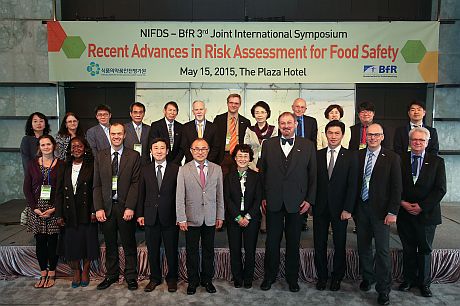Cooperation agreement with Korean Food and Drug Administration renewed
On 14 May 2015, the German Federal Institute for Risk Assessment (BfR) renewed its cooperation agreement with the South Korean National Institute of Food and Drug Safety Evaluation (NIFDS). "South Korea is one of the leading Asian countries, particularly in the field of Total Diet Studies, and Germany, too, is setting international standards with its Total Diet Study", says BfR President Professor Dr. Dr. Andreas Hensel. "This is why scientific cooperation is exceptionally fruitful for both countries, especially in this area." The declaration of intent provides for scientific and technical cooperation between the two institutions, including amongst other things joint cooperation programmes, workshops, conferences, seminars and research scientist visits.

At the third symposium organised by the BfR and the NIFDS, “Recent Advances in Risk Assessment for Food Safety”, BfR President Professor Dr. Dr. Andreas Hensel spoke in front of approximately 100 participants about the challenge of food and feed safety especially with regard to authenticity and falsification of foodstuffs in the era of globalisation. Whilst doing so he presented the “FoodChain-Lab” software developed at the BfR, which can be used to help follow product chains.
A main focus of the symposium was an international comparison of Total Diet Studies. Representatives from risk assessment agencies from Germany, Korea and the USA discussed their experiences with Total Diet Studies. These serve to estimate the average occurrence of substances such as contaminants, nutrients and residues in ready-to-eat foods. In order to be able to make international comparisons of the results and evaluations, it is necessary to harmonise the studies and the methods used.
The Korean Total Diet Study is attracting worldwide attention not just because of the volume of data collected. The German study is of particular interest internationally due to its innovative approach. As part of this, the range of ready-to-eat foods to be studied and the variability of contents taken into account is adapted to suit the requirements of each substance group to be examined. The cooperation between Germany and Korea allows for the agencies to provide each other with data for the purpose of conducting their studies.
Another symposium subject was the intake of caffeine by certain demographic groups. The BfR presented its study on the consumption of energy drinks on certain occasions such as club visits and LAN parties. The Korean researchers reported on caffeine intake in the Korean population, as well as the risk perception regarding high-dose caffeine drinks among Korean adolescents.
The third point of focus concerned the avoidance of poisonings within the population. The BfR presented its project “National Monitoring of Poisonings”, as part of which - in future - case reports from poison information centres will be collected and evaluated. The BfR also presented its award-winning App “Accidental Child Poisonings” (Vergiftungsunfälle bei Kindern). The NIFDS wants to develop a Korean App for accidental poisonings based on this model.
The BfR and NIFDS signed their first cooperation agreement in 2010. South Korea has concluded free trade agreements with both the EU and the USA.
Further information can be found at:
About the BfR
The German Federal Institute for Risk Assessment (BfR) is a scientific institution within the portfolio of the Federal Ministry of Food and Agriculture (BMEL) in Germany. It advises the Federal Government and Federal Laender on questions of food, chemical and product safety. The BfR conducts its own research on topics that are closely linked to its assessment tasks.
